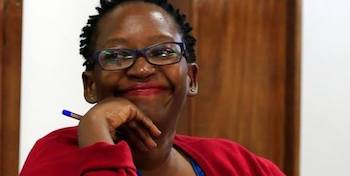Dr. Stella Nyanzi
Dr. Stella Nyanzi, the Ugandan academic and critic of the country’s military dictator Gen. Yoweri Museveni has been fighting for her life at Mmengo Hospital, in Kampala, the capital.
Dr. Nyanzi, until the February 21, 2020, had spent over 18 months in the country’s notorious Luzira Maximum Security Prison on a politically-motivated conviction for “annoying” the dictator, who has ruled the country since he seized power in 1986. Amidst fears by her supporters that she may have been poisoned, she was admitted shortly after she was contacted for an interview by this media outlet.
Dr. Nyanzi was recently featured in a New York Times article during which she said her wrongful incarceration hasn’t tempered her and she spoke critically about the kleptocratic dictator.
When contacted Sunday, April 5, Dr. Nyanzi, formerly a scholar at the nation’s top university, Makerere, informed this reporter that she was unwell. “I’m not feeling well for the interview, but you can write down the questions. I will endeavor to answer your questions.” The next-day, this media outlet received a text message from her cellphone number saying,”Stella was admitted yesterday and she is in Mmengo Hospital.”
“I have trauma triggered by torture in prison. Don’t believe the lie that Janet murdered me! She has learnt to fear me,” she added. Dr. Nyanzi’s reference was to Janet Museveni, wife of the dictator, who is also the country’s minister of education, a position for which she is profoundly unqualified.
Later, this media outlet received a video of Dr. Nyanzi that’s since gone viral on WhatApp and has also been posted on YouTube. ”I was very sick, I was very dehydrated, I was foaming in the mouth,
I was vomiting and I had nausea,” Dr. Nyanzi states in the video, where she’s shown seated on a hospital bed, looking extremely weakened and barely able to speak, a far cry from her normally booming attacks on the dictatorship’s human rights abuses. “I have been vomiting for about six-days before my family decided that the dehydration was too much and so, they decided to bring me to hospital by emergency services.”
Dr. Nyanzi was at home for six days enduring the illness because the Covid-19 coronavirus shutdown by the government has made it difficult for any travel without authorization.
“…I was dehydrating and being hungry and I could have died of hunger, simply because there was no transport to get me from home to a place where I could be infused with saline or glucose,” Dr. Nyanzi, said.
She thanked the hospital for treating her —hospitals sometimes face retaliation by the brutal dictator for treating people perceived to be regime-opponents— and she added, “… I can now sit up, the nausea has stopped the foam has stopped, although, I am quite weak, I am able to take care of my personal hygiene need on my own right now.”
She thanked her family and relatives for pooling money to pay for her medical expenses and for food. She said she’s being taken care of by her daughter Barack, and her nephew Sharifah. In the video, she also addresses her supporters concerns about possible poisoning, in carefully chosen words: “I want to assure Ugandans that, I am not dying as people have been saying. I am not poisoned, as far as I know. We are still waiting for the good laboratory results of the Mmengo hospital to conclude their results.” Rather than allay fears, the comments raised more concerns.
She also concluded, cryptically, “I thank you all, and I love you all. Keep safe. Make sure you don’t die of corona and that you also don’t die of other ailments such as the one that was disturbing me at home.” Many of her supporters read a deeper message in those words.
Ugandans recall how Cerinah Nebanda, another once vocal critic of the dictator, who denounced corruption during a speech in Parliament, died soon after of an undisclosed sudden ailment. Her supporters believe she was murdered, poisoned on Gen. Museveni’s orders. When her family tried to send her tissue samples to South Africa for testing, soldiers arrested the person at the airport and confiscated the specimen.
The favorable Western press once enjoyed by Gen. Museveni collapsed after a Chinese national was convicted in December 2018 in a U.S. federal trial for bribing the dictator $1 million which he split with his foreign minister Sam Kutesa. The bribe was for illegal concessions in Uganda’s oil industry on behalf of giant Shanghai-based CEFC China Energy. U.S. gained jurisdiction when Patrick Ho Chi Ping used a New York-based bank to wire Kutesa’s cut of the bribe to an account in Uganda.
Museveni’s cut was delivered in cash wrapped as gifts when Patrick Ho traveled to Uganda on a Gulf Stream jet in May 2016 for the dictator’s swearing in after another rigged election.












